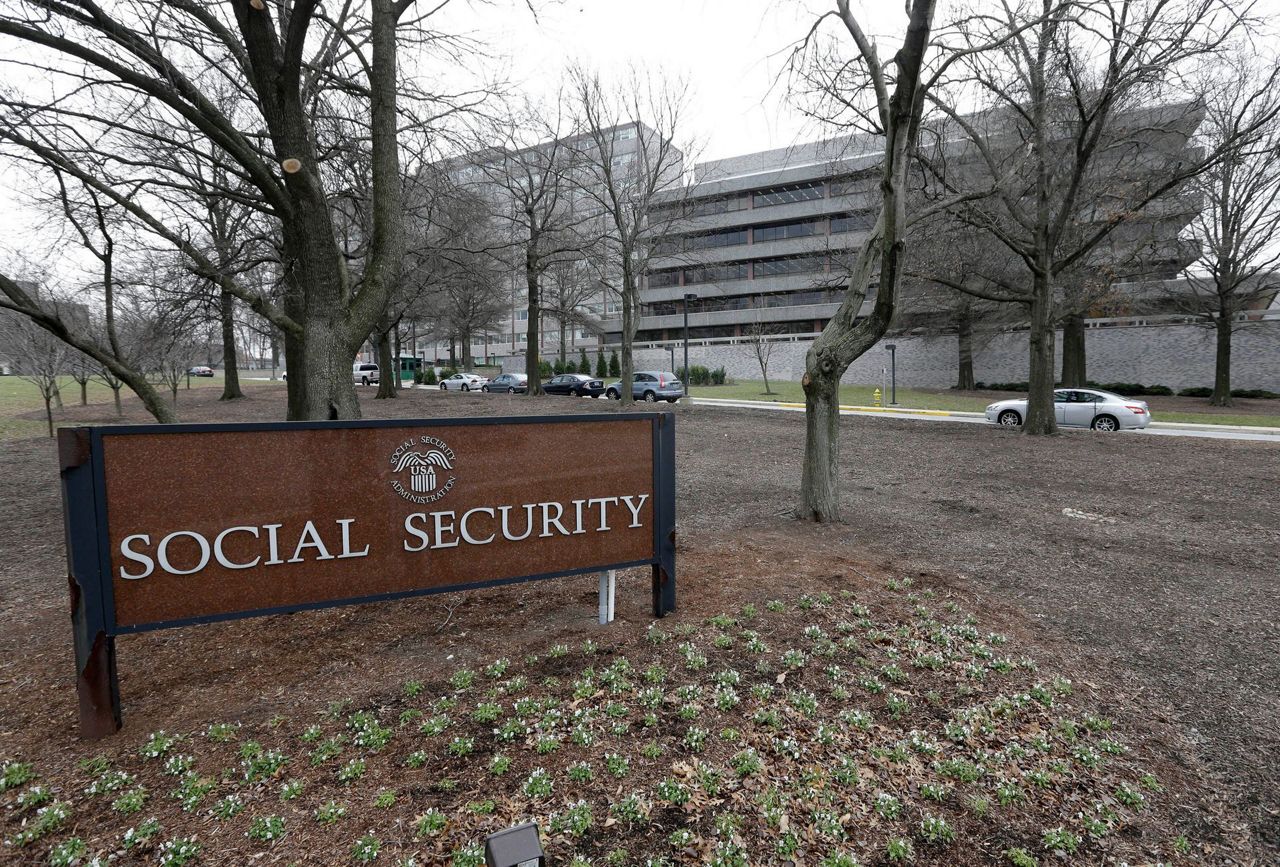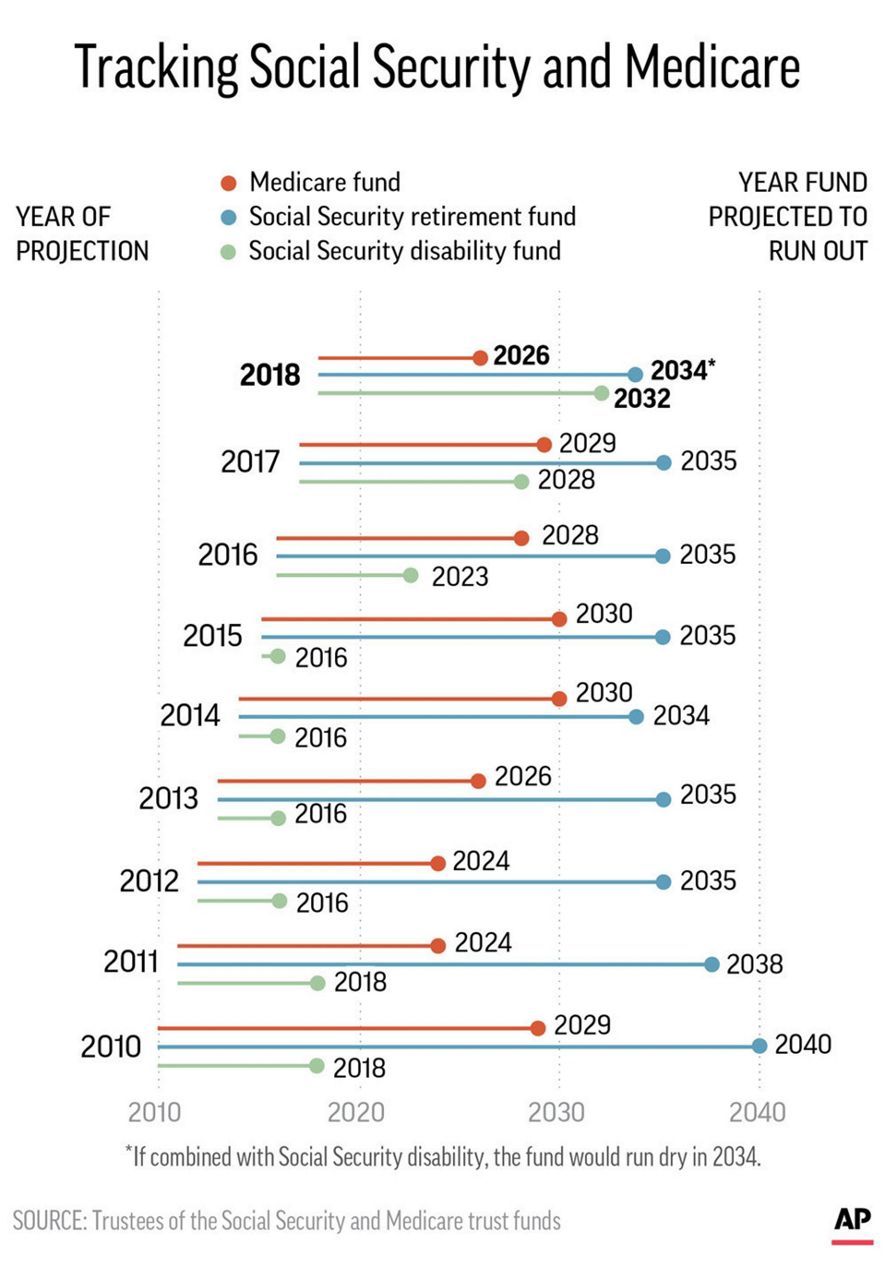WASHINGTON (AP) — An unexpected weakening in the finances of Social Security and Medicare has raised concern about the bedrock programs for the middle class. The problems may only keep getting worse in a time of political tension and deep partisan divisions.
Here are some questions and answers on an issue that ultimately will affect every American family and isn't going away:
WHAT'S NEW?
The government's annual Trustees Reports on the programs shows the financial condition of both worsening significantly since last year. The projected insolvency for Social Security stayed unchanged — in 2034 — but Medicare's moved three years closer, to 2026.
A more immediate warning signal caught the eye of experts.
Both programs will start tapping their reserves this year, meaning that income from payroll taxes and interest earned by the Social Security and Medicare trust funds will no longer cover costs. That threshold was still a few years away in the 2017 checkup.
"The near-term outlook in both programs got substantially worse," said Republican economist Charles Blahous, a former public trustee helping to oversee program finances. "What is unusual in the space of one year is to go from something that isn't supposed to happen for four or five years to something that's happening right now."
As a result, Social Security and Medicare will need a $416 billion transfer from the government's general revenues this year, when the federal deficit is shooting up due to tax cuts and increased spending.
__
SHOULD WE BE WORRIED?
"Yes," said Leon Panetta, a Democratic elder statesman who held many government posts over a long career, from California congressman to White House budget director, defense secretary and CIA director.
"What people have to worry about is that in a democracy we govern either by leadership or by crisis," Panetta added. "What you are looking at right now is a situation where crisis is going to be driving decisions. Rather than fixing it today, which is what we should be doing, we're simply going to postpone the day."
Panetta is co-chair of the Committee for a Responsible Federal Budget, a nonpartisan watchdog group.
__
WHAT'S WRONG WITH WAITING?
"A lot of people in Congress are focused on what's going to happen tomorrow, not what's going to happen in 2026," observed Rep. Frank Pallone, D-N.J.
But waiting in the context of Social Security and Medicare inflicts more pain, leading to bigger tax increases, benefit cuts as high as 20 percent, or some combination of both, as the programs slide deeper into the hole.
Younger people, less likely to be following the debate, have the most to lose.
"Really the system is fine for older people; it's not fine for younger people," said Robert Bixby of the Concord Coalition, a nonpartisan group that advocates better control of federal budgeting.
"People under 50 are paying into a system that can't afford to pay them the benefit it's promising them, and I don't think they realize it. The more we delay reforms, the more sudden and draconian they would be, especially for younger people."
__
WHAT ARE SOME POLICY OPTIONS?
They boil down to tax increases and benefit cuts, with an effort to spare current retirees of modest means.
Options for Social Security include lifting the limit on which payroll taxes are levied (now $128,400), reducing annual cost-of-living increases, raising the underlying payroll tax rate, changing the benefit formula, and raising the full retirement age (now gradually rising to 67).
Options for Medicare include raising the eligibility age —now 65— to match Social Security's, cutting payments to medical service providers, raising premiums for beneficiaries, and raising the payroll tax.
Some groups are drawing a line against benefit cuts.
"Core Medicare coverages which exist under current law should not be diminished for current or future beneficiaries," said Judith Stein, head of the Center for Medicare Advocacy, which provides legal help to beneficiaries. "Until we actually try to negotiate Medicare drug prices, we are spending billions of dollars a year that could be saved for the program."
__
WHERE DO TRUMP AND LAWMAKERS STAND?
Trump promised not to cut Social Security or Medicare, and Treasury Secretary Steven Mnuchin recently suggested that tax cuts, rolling back regulations, and better trade agreements could boost economic growth and help stabilize the programs.
But nonpartisan government experts who produced the annual Social Security assessment don't seem to be buying that, forecasting "sustained moderate economic growth."
Republicans in Congress are losing their most prominent advocate for overhauling benefit programs with the retirement of House Speaker Paul Ryan of Wisconsin. Their budget credibility is seen as damaged after passing major tax cuts and spending increases.
Democrats want to expand social programs, not pare them back.
Problem-solving is becoming a lost skill in Washington, said GOP economist Douglas Holtz-Eakin.
"There used to be a playbook where the White House provided leadership and gave air cover to Congress to do hard things, so members could go home and defend their votes," said Holtz-Eakin.
"Maybe such a strategy is being hatched behind closed doors at the White House," he added, but "to date, there is no evidence."
Copyright 2018 The Associated Press. All rights reserved. This material may not be published, broadcast, rewritten or redistributed.




